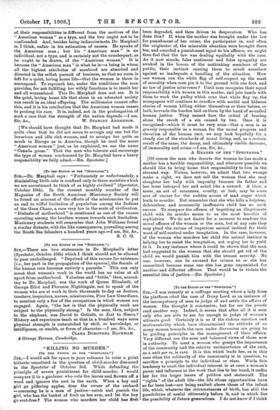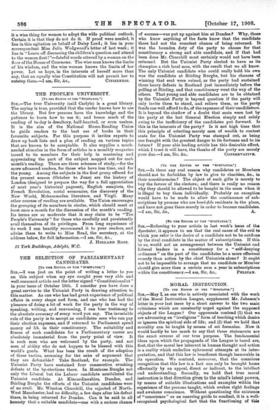[To THE EDITOR OF VIZ SPZCTATOR."1 was recently at a
suffrage meeting where a lady from the platform cited the case of Daisy Lord as an instance of the incompetency of men to judge of and settle the affairs of women. She thought it conclusive; but for me the proofs read another way. Indeed, it seems that after all it is men only who are able to see far enough to judge of woman's ultimate good. Certainly it is so if the riotous emotion and sentimentality which have characterised the attitude of so many women towards the case under discussion are going to be guiding principles in the management of their affairs. "Very different are the sane and balanced views of those now in authority. To meet a woman who grasps the importance of the community and the relative unimportance of the unit, as a unit per Be, is rare. It is this which leads her, as in this case when the solidarity of the community is in question, to sacrifice a principle to the individual or class. While this tendency to exalt the individual interest is at once a woman's power and influence in the work that lies to her hand, it unfits her for the larger issues of politics and statecraft. The "rights" of the adult life—the life whose opportunities have so far been lost—are being exalted above those of the infant life, which, whatever the circumstances of birth, has still the possibilities of useful citizenship before it, and in which lies the possibility of future generations. I do not know if I think
it a wise thing for women to adopt the wide political outlook. Certain it is that they do not do it. If proof were needed, it lies in this agitation on behalf of Daisy Lord; it lies in your correspondent Miss Julia Wedgwood's letter of last week ; it lies in "Leave off discussing the children's question and attend to the women first ! "—fateful words uttered by a woman on the floor of the House of Commons. The wise man knows the limits of his wisdom, and the wise woman knows the limits of her power. Let us hope, in the interests of herself more than any, that an equally wise Constitution will not permit her to















































 Previous page
Previous page